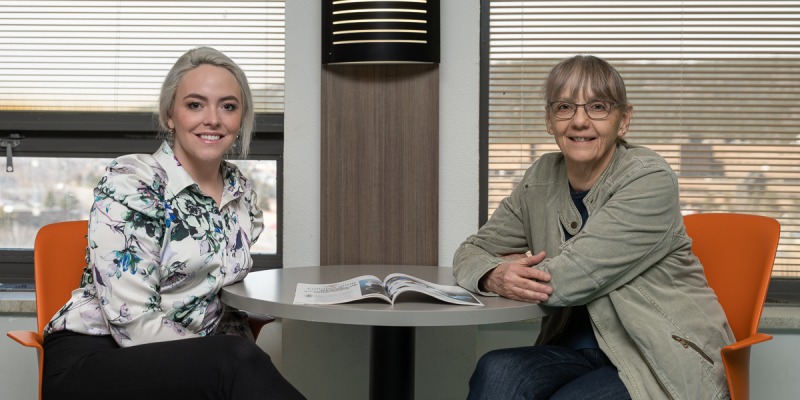New partnership aims to improve services for psychiatric patients

What do a Faculty of Nursing professor, a young psychiatric nurse and a veteran nurse with more than 30 years of experience at the Waterford Hospital have in common?
Along with their shared interest and background in mental health nursing, Dr. Joy Maddigan, and registered nurses Chantille Haynes and Debbie Meaney are part of a new academic-practice partnership being developed between Memorial’s Faculty of Nursing and Eastern Health’s Mental Health and Addictions Program.
The focus of the proposed collaboration is to put nursing research into clinical practice to help make life better for clients at the Waterford Hospital in St. John’s.
From study to practice
A Memorial nursing alumna, Dr. Maddigan returned to her alma mater with a mission to get research into the hands of practising nurses for the good of their patients and families.
Part of the journey was receiving funding from Memorial’s Quick Start program; then, serendipity brought Ms. Haynes to her office one day looking for advice about her master’s program.
Ms. Haynes, who has spent the past seven years practising at the Waterford Hospital, wanted to focus her master of nursing practicum on psychiatry.
“I just feel that patients don’t have a strong voice and they are in need of help. I really enjoy working with patients and I want to be there for them.” - Chantille Haynes
In the faculty’s project-based master’s practicum option, nurses study issues and propose solutions to problems they identify in their own practice.
“I just feel that patients don’t have a strong voice and they are in need of help,” she said. “I really enjoy working with patients and I want to be there for them.”
For her project, Ms. Haynes studied the feasibility of establishing a collaborative to promote psychiatric mental health nursing research between the Faculty of Nursing and Eastern Health, and later wrote about it in the Journal of Nursing Management.
In turn, administrative leaders from both organizations expressed interest in and support for the initiative and suggested ways the collaborative could work to their mutual benefit.
Promoting recovery
During consultations with nurses from the Mental Health and Addictions Program, Ms. Haynes raised questions such as, were they interested in research? How could they use research findings in their practice? What sorts of barriers did they face integrating it into their practice? And, what sort of research projects could promote recovery for their patients?
Through this dialogue, the nurses identified community meetings as a therapeutic activity for patients. That’s how one of the consultation participants, Ms. Meaney, got involved and became part of the research team.
"You see them in a different light and they see you in a different light.” - Debbie Meaney
“When I first started my nursing practice at the Waterford, the senior nurses on staff led community meetings with the patients, and it gave them an opportunity to interact with each other,” said Ms. Meaney. “You see them in a different light and they see you in a different light.”
Shared experiences
The team loved the idea. With more funding from the Health Care Foundation, they hired a research assistant, also a nurse at the Waterford, and began piloting a series of community meetings this past February.
Gatherings were not facilitated as meetings in the formal sense and were not treated as therapy sessions, but provided a structured time during the evening in a communal space where patients and nurses got together to discuss the events of the day.
It’s an opportunity for patients to share their experiences on the unit, to problem-solve and build relationships with other patients and the nursing staff.
“We’ve gotten good feedback,” said Ms. Haynes. “Patients feel this was something needed and valued.”
While busy schedules and staffing issues continue to create challenges, Waterford Hospital nurses like the project’s aim to make hospital life better for their patients.
It’s a conversation Dr. Maddigan hopes to continue.
"The social justice mandate of nursing is about health equity and we cannot turn our backs on the mental health population." - Dr. Joy Maddigan
“The social justice mandate of nursing is about health equity and we cannot turn our backs on the mental health population,” she said. “They are among the most disenfranchised group, they really need people to facilitate change with them.”
A final decision on the proposed academic-practice partnership with Eastern Health is expected sometime this summer.